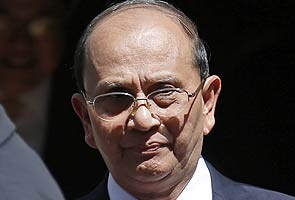
Myanmar President Thein Sein (Yangon)
Yangon:
Myanmar's reformist president has warned that newly-won media freedoms could be curtailed if stability is threatened by religious bloodshed shaking the former military-ruled country.
Thein Sein, whose administration has been accused of failing to stem two years of sporadic anti-Muslim violence, vowed "zero tolerance" against the perpetrators of fighting in the second largest city Mandalay that left two dead last week.
But he also fired a shot across the bows of the media, after inflammatory material posted online was blamed for stoking the unrest.
"We have attained one of the highest levels of press freedom in Southeast Asia, with the right to speak and write freely, because of political reform which is crucial in the transition process," the former general said in a speech published by state media Tuesday.
"However, if media freedom threatens national security instead of helping the nation, we warn that we will take action under existing laws," he added.
The latest unrest broke out on July 1 after an accusation of a rape of a Buddhist woman by two Muslim men from a local tea shop was spread on social media websites, prompting a crowd of hundreds to gather near the business, hurling stones and damaging property.
Violence continued for several days, despite a heavily increased security presence in the city, leaving one Muslim and one Buddhist dead and more than 20 people injured.
Police told AFP they had arrested nearly 400 people, mainly for breaking an overnight curfew.
Social media users were unable to access Facebook on Thursday and Friday nights, amid speculation that Myanmar had blocked the site to curb the spread of inflammatory comment online.
The website has since been accessible and neither the government nor Facebook have yet commented on the outage.
Buddhist-Muslim clashes have left at least 250 people dead and tens of thousands displaced since fighting first broke out in Myanmar's western Rakhine state in 2012.
Most of the victims have been Muslim and violence has often erupted as a result of rumours or individual criminal acts.
Radical Buddhist monks have been accused of fanning religious tensions, with Mandalay-based hardline cleric Wirathu posting a link to the rape allegations just hours before the unrest broke out.
Thein Sein said "serious action" would be taken against those involved in conflict.
Reforms under his quasi-civilian government, which took power in 2011, have included ending pre-publication censorship.
But activists have accused the government of backsliding on press reforms with the introduction of vague media laws and the prosecution of several local journalists.
Thein Sein, whose administration has been accused of failing to stem two years of sporadic anti-Muslim violence, vowed "zero tolerance" against the perpetrators of fighting in the second largest city Mandalay that left two dead last week.
But he also fired a shot across the bows of the media, after inflammatory material posted online was blamed for stoking the unrest.
"We have attained one of the highest levels of press freedom in Southeast Asia, with the right to speak and write freely, because of political reform which is crucial in the transition process," the former general said in a speech published by state media Tuesday.
"However, if media freedom threatens national security instead of helping the nation, we warn that we will take action under existing laws," he added.
The latest unrest broke out on July 1 after an accusation of a rape of a Buddhist woman by two Muslim men from a local tea shop was spread on social media websites, prompting a crowd of hundreds to gather near the business, hurling stones and damaging property.
Violence continued for several days, despite a heavily increased security presence in the city, leaving one Muslim and one Buddhist dead and more than 20 people injured.
Police told AFP they had arrested nearly 400 people, mainly for breaking an overnight curfew.
Social media users were unable to access Facebook on Thursday and Friday nights, amid speculation that Myanmar had blocked the site to curb the spread of inflammatory comment online.
The website has since been accessible and neither the government nor Facebook have yet commented on the outage.
Buddhist-Muslim clashes have left at least 250 people dead and tens of thousands displaced since fighting first broke out in Myanmar's western Rakhine state in 2012.
Most of the victims have been Muslim and violence has often erupted as a result of rumours or individual criminal acts.
Radical Buddhist monks have been accused of fanning religious tensions, with Mandalay-based hardline cleric Wirathu posting a link to the rape allegations just hours before the unrest broke out.
Thein Sein said "serious action" would be taken against those involved in conflict.
Reforms under his quasi-civilian government, which took power in 2011, have included ending pre-publication censorship.
But activists have accused the government of backsliding on press reforms with the introduction of vague media laws and the prosecution of several local journalists.
Track Latest News Live on NDTV.com and get news updates from India and around the world

